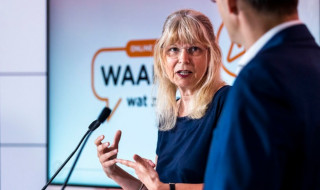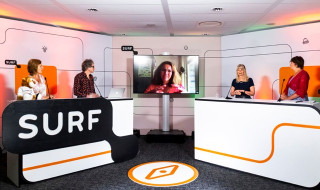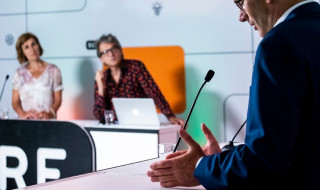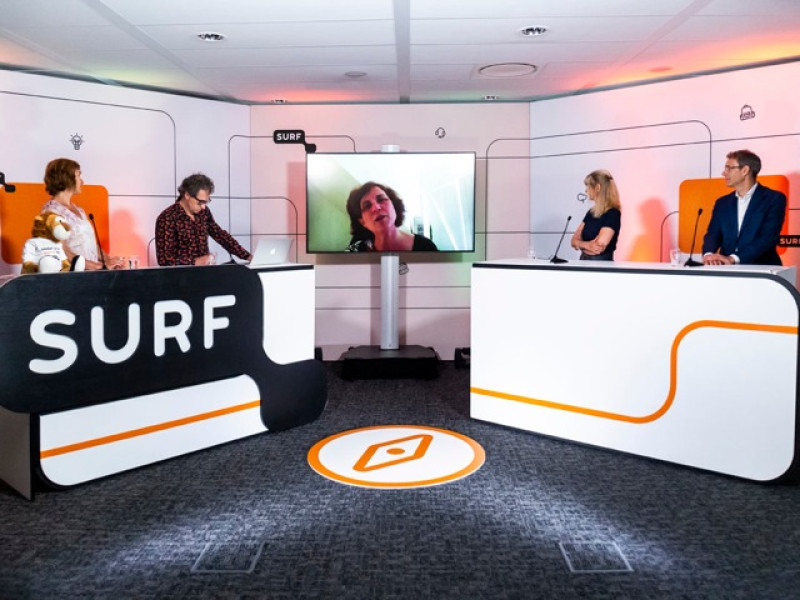If 360 Dutch municipalities can agree on a common municipal IT infrastructure, shouldn't we also be able to build our own education file for each student?
With a series of seven online seminars for board members in education and research, SURF is initiating the discussion about how we as a sector can join forces to protect public values in IT. We look back at the seminar series with some of the board members present in 3 SURF Magazine articles.
Review of the seminar series on public values - part III
Board members of educational institutions face dilemmas when protecting public values with digitization. They can talk about this in other public sectors. SURF is organising a series of seminars on protecting public values. We look back on the third series of seminars with board member Mirjam Koster.
Valuable. That's the first word that comes to mind for Mirjam Koster, Chair of the Board of Governors of the Graafschap College, when she thinks back to the seminars on public values in education. She thinks it's funny that this word should come to mind, and yet it's true: every time a seminar took place on a Friday afternoon, she was glued to the screen of her laptop. 'It felt like I was physically present and participating in the room.'
For her, the value of the online seminar series lies in the quality of the conversation. The questions of interviewer Frénk van der Linden and the reflections of philosopher Marjan Slob contributed greatly to that, as did the discussions that went straight through the education column. 'Depending on the issue, the participants were clustered intersectorally and sometimes also regionally,' says Koster. 'That works well. In concrete terms, it provided me with relevant reading tips for education administrators. I distribute them in my own network of mbo managers, but also among managers of secondary education in the region and within my own organisation.'
Common Ground
After the first series on the tension between cultural, private and public values, and the second series on the data and content revolution, the third series dealt with the question: what can board members do? How can public organisations collectively safeguard values in the face of digitization? To find an answer, we looked over the fence at other sectors. Nathan Ducastel of the Association of Netherlands Municipalities (VNG) talked about Common Ground, the step-by-step development towards a future-proof municipal IT infrastructure. Common Ground enables municipalities to exchange data quickly, more securely and in compliance with the AVG with parties inside and outside the government. Mirjam Koster is impressed by what VNG is able to achieve. 'The 360 municipalities have to deal with all kinds of different target groups, just like we do in education. Yet they manage to work their way up to a municipal IT infrastructure. If they can do that, we should also be able to build our own education file for each student, to name but one side street.'

PublicSpaces
José van Dijck, Professor of Media and Digital Society and a guest in Seminar 6, is convinced that it is precisely education, with all its knowledge, that can set something in motion. But then universities, colleges and vocational schools should consciously focus on the long term. At the moment, choices are often made on the basis of short-term considerations: rather more user convenience now than a safer online environment for students and instructors later. Geert-Jan Boogaerts, head of Innovation and Digital Media at the VPRO, sees how his colleagues in the cultural sector are wrestling with the same dilemma. Public broadcasting corporations have a statutory assignment to reach many people with their programmes. But how, for example, can you publish a critical Tegenlicht episode about data capitalism and at the same time advertise it on Facebook? Boogaerts founded the PublicSpaces coalition in order to have the sector make different choices together. If all Dutch museums, broadcasters, festivals et cetera would move their content to a better alternative, he argues, it would have a real impact. In five years' time, they want to have reached the point where no public institution has to use products that are at odds with public values.
Realise that as a public institution you are not powerless against the tech giants.
Asking the right question
Both Boogaerts and his co-host in Seminar 7, Valerie Frissen of the SIDN Fund, insist on the negotiating power and developmental strength of the education sector. These are considerable, particularly if the education sector is committed to safeguarding its crown jewels: the data. Don't wait and see, but take the lead and trust in what you can achieve together. A condition for being strong is that more standardisation of educational information takes place. For this, it is essential that everyone speaks the same language. Confusion of tongues is still the order of the day. Koster: 'Unfortunately, we started the year with a flat (non)discussion about online versus physical education. The wrong question in the Lower House led to the wrong debate in the sector. The right question leads to an entirely different conversation. That is and remains the question of how to develop good education.'

Koster sees a role for SURF in acting as an interpreter. 'An interpreter facilitates the conversation, has several dictionaries in his bag, is prepared to cross borders, and is himself relatively neutral and reliable.' She continues: 'A good interpreter notices when parties are saying the same thing and will put them together to continue the conversation. He knows how to connect the parties.'
We train young people to a large extent, in the case of the mbo from the age of 16. What we now set up and think up in the area of digitization will have an impact throughout their lives.
Dilemmas
The seminar series has made Koster even more aware of the stewardship that educational institutions have over their students. 'For a large part, we educate young people, in the case of the mbo from the age of 16. What we now set up and think up in the area of digitization, has an effect on their whole lives.'

Digitalisation confronts board members with difficult decisions. Learning environments and cooperation organisations are constantly inviting educational institutions to participate in digital initiatives. If they do not, they are accused of not keeping up with the times or the market. Participation, however, also leads to the creation of a whole landscape of applications within the institution. Koster: 'The student goes completely crazy with all the different environments for co-creation and collaboration. They have no idea where their data is. They end up not only with software suppliers, but also with workplace supervisors, the people in the field with whom we work. It is possible to screen everything off, but is that the solution that will teach us the most? If we don't get on board, the ship won't come off the dock either.'
The insight that all board members wrestle with the same dilemmas already helps. During the seminar series, it often emerged that they have no ready-made answer. Koster: 'Not knowing or only half knowing was certainly a common thread, but the fact that you discuss it among yourselves is certainly part of what made the series so valuable.'
Text: Marjolein van Trigt
Photos: Beeldredaktie
Values Guide
SURF and Kennisnet have developed a Values Guide. The Values Guide provides a common language for conducting a dialogue about digitization in education. By discussing the values that should be paramount in digitization, the Dutch education sector can make better choices for new technological developments.
About the seminar series
The corona crisis is increasing the role of digitization in education and with it our dependence on dominant market parties. Reason enough for SURF to organise a series of seven online seminars about protecting public values. Under the guidance of journalist and moderator Frénk van der Linden and philosopher Marjan Slob, board members will enter into discussion with one another. The series consists of 3 parts, of which part I and II have been completed.
- Part I consisted of three meetings that together explored the emergence of tension between cultural, private and public values in the process of digitization.
- Part II of the seminar series, which is the subject of this article, was about public values and IT in the context of education and research.
- In Part III, we explore how we can secure shared values in IT. We will share the conclusions from these sessions in this article.
'Review of the seminar series on public values - part III' is an article from SURF Magazine. Monthly the newest articles in your inbox? Then subscribe to the SURF Magazine newsletter (in Dutch).
Questions about this article? Mail to magazine@surf.nl
